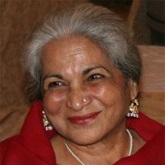Raihana Hasan

Birth—
|
After graduating from Lahore’s Kinnaird College and obtaining a Master’s degree from Karachi University, Raihana Hasan worked as a Research Fellow in English Literature at the university until her marriage to a planter catapulted her into the tea gardens of East Pakistan (now Bangladesh), where she spent nearly a decade. She and her family lived through the terror unleashed by the 1970 election but the internecine massacres of the ensuing civil war forced them to flee for their lives across enemy country to resettle in Karachi.
In helping to rebuild the family fortunes, she taught at a college, compered a children’s television programme and worked as an advertising copywriter before joining Pakistan International Airlines, where she served in various capacities for twenty-four years until retiring as a General Manager. She now lives in Karachi and is a freelance editor, translator, columnist and writer. The question readers ask most frequently is how I remember so much after forty years. The answer is that soon after arriving in Karachi, I started recording my experiences of March-May 1971 while they were fresh in mind. This was in preparation for an article for The Christian Science Monitor, intended to draw attention to the massacre of East Pakistan’s non-Bengali and pro-federal Bengali population. Their suffering was, and is still, largely unrecognized and unacknowledged. The foreign media had been concentrating almost exclusively on the atrocities perpetrated on East Wing Bengalis and the Pakistani press had imposed a clampdown on the news to avoid a backlash against Bengalis resident in the West Wing. That article was never finished, but as time and research gave me a better perspective and a more impartial understanding of the 1971 situation, my notes grew into the last three sections of this book. The first two sections are based on my detailed letters to my mother, which she had preserved. These letters describe life in tea from the day I arrived in early January 1962 until the end of February 1971. To this material, I added the information I had gleaned to satisfy my own curiosity about the history of the tea industry in the subcontinent. This second edition is presented against the backdrop of the alarm bells now ringing in Baluchistan, in the hope that history will not repeat itself and that future authors will not be writing stories about how Pakistan lost yet another part of itself.
|
